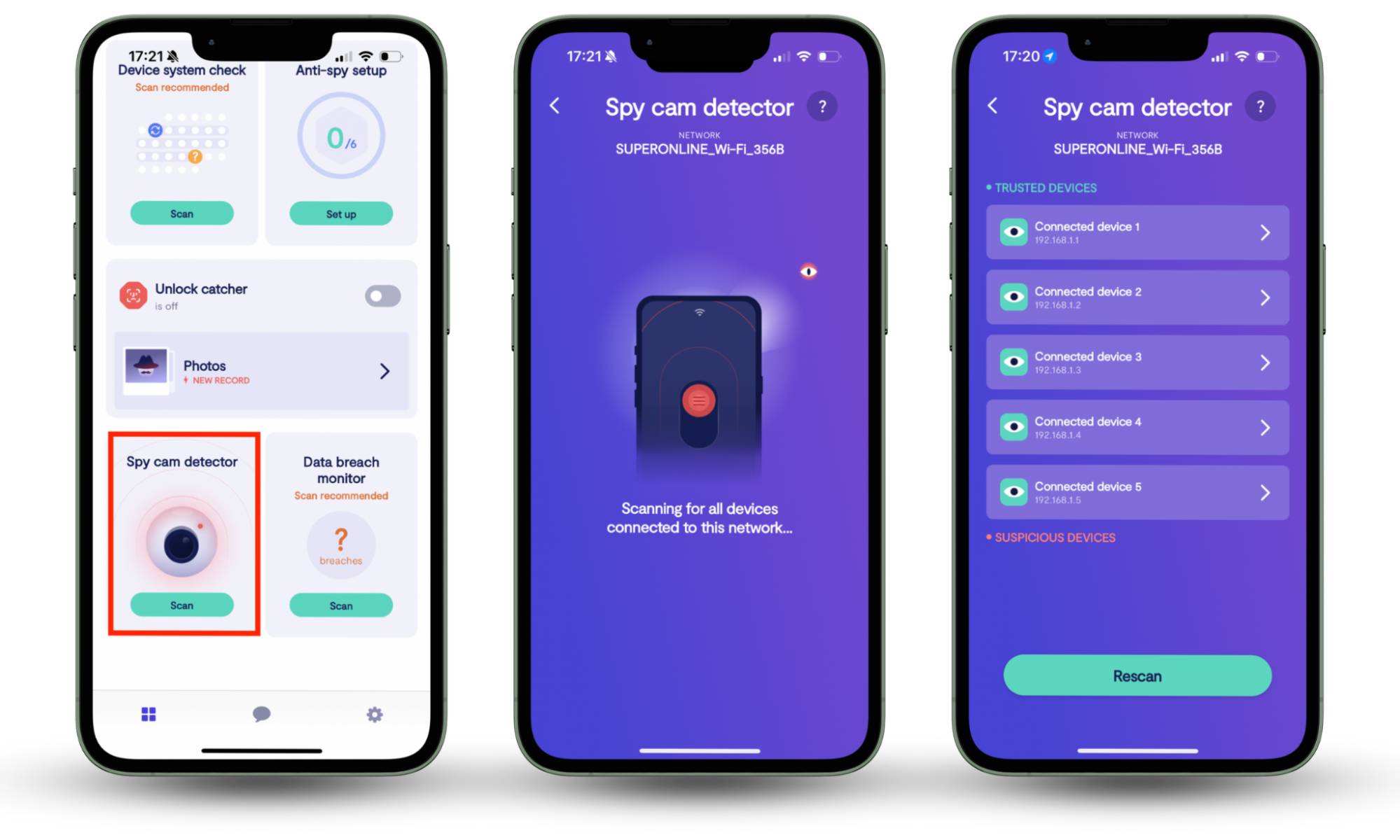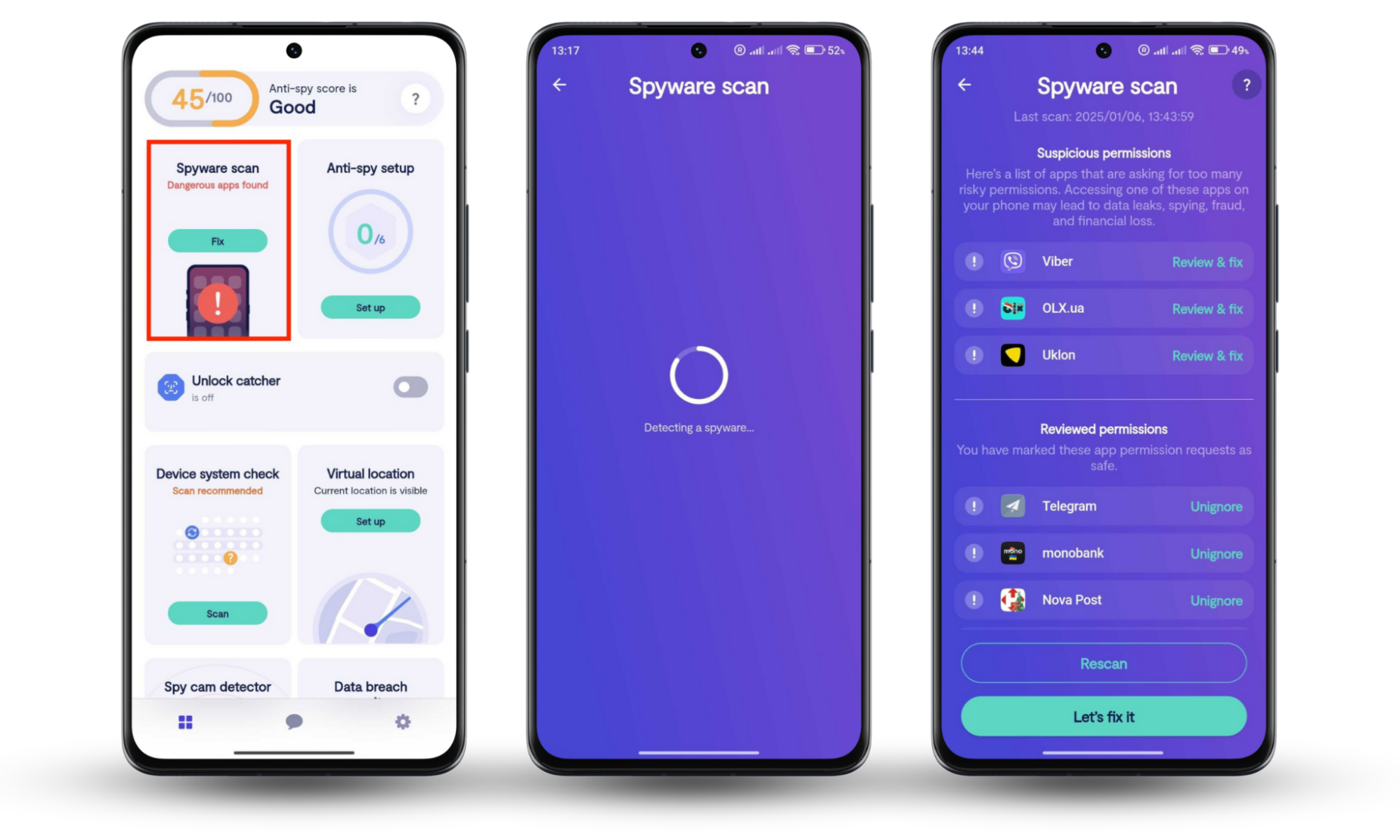Table of contents
- How can someone spy on you in your home
- 1. Physical equipment
- 2. Hacking of digital devices
- How to tell if someone is spying on you in your home
- 1. Physical signs of activities in the home that you did not do
- 2. Things are lying differently than you left them
- 3. The house locks suddenly started to get stuck
- 4. New items in your home appear from nowhere
- 5. Your home has been broken into, but nothing was stolen
- 6. Suspicious equipment in your home
- 7. Strange behavior of people in your home
- 8. Unusual activity of CCTV cameras
- 9. Your TV or AM/FM radio starts to experience unusual interference
- 10. Strange phone calls or messages
- 11. Unusual activity and a change in the performance of your devices
- How to detect surveillance devices in your home
- 1. Check for hidden cameras
- 2. Using a spy bug detector
- 3. Checking your devices for hacking and spyware
- 4. Contact the professionals
- Conclusion
How can someone spy on you in your home
Unfortunately, there are a few ways that someone can spy on you in your home. They might use surveillance equipment, like cameras or audio devices. Alternatively, they could hack into your own devices, such as your laptop, phone, or even your smart home technology.
1. Physical equipment
Someone can spy on you in your home with hidden cameras or listening devices—also called bugs.
Stalkers don’t just follow you or look through a window. They could install surveillance equipment in your house. This is most likely to happen if they have access to your home—for example, if your ex is stalking your house and has a key or if your landlord is spying on you.
Expert tip
In most cases, it’s against the law to use surveillance equipment in someone’s home.
1.1 Listening devices
Listening devices record the sound in a room or during a phone call.
They’ll transmit the audio to a device in another location, so someone can listen in on your conversations.
They’re often battery-powered, so you won’t find them by checking electrical outlets.
And, unfortunately, they can be small and easily hidden.
1.2 Hidden cameras
Hidden cameras usually record video—and sometimes audio. Like listening devices, they can be very small and hidden easily.
Worried about hidden cameras? Clario Anti Spy’s Spy cam detector can help. It checks devices that are connected to your Wi-Fi network to help you find any unexpected devices and potential spies.
How to use Clario’s Spy cam detector:
- Download the Clario Anti Spy app and follow the on-screen instructions to sign up.
- Open the app and tap the Spy cam detector.
- Wait for the app to scan.
- When the scan is complete, check the devices listed—do you know and trust them all? If you notice suspicious devices, you may be able to tell if someone is spying on you in your home.

2. Hacking of digital devices
If someone can’t get into your home, they might hack your devices to spy on you instead.
Even if they can get into your house, they might still access your devices—after all, that way, they can access messages, pictures, and videos.
2.1 Video surveillance cameras
If your cameras are connected to the internet, this is an easy way for someone to spy on you in your home. They might guess your passwords to monitor your cameras online or find a vulnerability in your security system and access it that way.
And, unlike a hidden camera placed by a stalker, you won’t suspect anything when you spot these cameras—after all, you probably installed them yourself.
2.2 Laptop
Your laptop almost certainly has a camera–and someone can spy on you in your home using it. They could activate the camera or microphone remotely.
Some hackers might also spy on what you’re doing on your laptop. They could install spyware so they can see what you’re typing or which websites you’re visiting.
Can your employer spy on you at home? If you use a company-issued laptop for work, your organization might have installed software on it to track your work. Some of this is probably legitimate. However, if they want to access your camera while you’re not on video calls, ask you to permanently have audio on, or want to put software on your personal computer, that could be suspicious.
2.3 Smartphone
Stalkers could try to access your phone camera or microphone or install spyware so they can see what you’re doing.
If you’re worried about spyware on your Android, Clario Anti Spy’s Spyware scan can help you. It finds apps that have too many unnecessary permissions, which could be a sign of a security risk. For example, most apps don’t need to access your camera or GPS.
How to check for spyware on your Android phone:
- Download Clario Anti Spy and follow the app’s instructions to sign up and log in. Then, open the app and tap Spyware scan.
- Wait for the app to scan your smartphone.
- Check the results and follow the on-screen instructions to fix any issues or remove spyware.

Expert tip
If you’re an iPhone user, you’re in luck–it’s harder to spy on iPhones because of their closed ecosystem. But stalkers can still spy on iPhone users with stolen Apple IDs or jailbroken phones. Clario Anti Spy can help here–use the Device System Check to see if your phone is jailbroken, and follow the on-screen instructions to restore your privacy.
2.4 Smart meters
If your smart meter is hacked, criminals have access to information about your electricity usage—which might help them to know when you’re away from home, or whether you have lots of expensive gadgets.
2.5 Home security systems
Ironically, someone can spy on you in your home using your security system. We’ve already talked about home surveillance cameras, but even larger wireless security systems can be hacked.
2.6 Smart vacuum cleaner
At first glance, the thought that someone can spy on you in your home using your vacuum cleaner might sound funny. But plenty of smart vacuums have a camera on board and connect to the internet—so if someone hacks into your vacuum, they can see into your home. There have been multiple cases of hackers accessing smart vacuum cleaners.
How to tell if someone is spying on you in your home
How do you tell if someone is spying on you in your home? Fortunately, there are often some signs.
1. Physical signs of activities in the home that you did not do
If someone has been in your house to bug it, things might look different.
Have electrical outlets or light switches been replaced? Is there any visible dust from drilling into walls or ceilings?
2. Things are lying differently than you left them
Have things been moved in your house? Sometimes you can tell if someone is spying on you in your home because they’ve moved some of your possessions so they can hide a camera or listening device.
3. The house locks suddenly started to get stuck
Stalkers often hide bugs in places you wouldn’t think to check—like a keyhole. If a camera or listening device is hidden in your lock, it won’t work as smoothly as before.
Alternatively, it could be a sign that someone picked or forced the lock to get in.
4. New items in your home appear from nowhere
Have you found something in your house that you don’t recognize? Whether it’s a new USB flash drive, pen, or smoke alarm, it could be hiding a bug.
5. Your home has been broken into, but nothing was stolen
If someone breaks into your home, you’d expect them to steal something. But if there’s been a break-in and nothing was taken, it might have been a stalker getting into your home to hide recording devices.
If you’ve been the victim of a break-in, contact local law enforcement immediately.
6. Suspicious equipment in your home
While we’ve talked about finding innocent objects like pens, sometimes it’s easy to tell if someone is spying on you in your home. You might find recording equipment, and you know it doesn’t belong to you.
7. Strange behavior of people in your home
Does your partner know what you’ve been doing even when they weren’t there? This could be a sign that they’ve been watching you.
Remember, even if people are allowed in your home, it’s not legal for them to track you without your consent. Whether it’s a landlord spying on tenants, a controlling partner following your movements, or an ex stalking you, you have a right to privacy.
8. Unusual activity of CCTV cameras
Is there a gap in recording on your CCTV cameras, or other unusual activity? Stalkers may disable your security system—perhaps so that they can get into your house undetected.
Alternatively, you might notice that your cameras have been accessed by another user.
Expert tip
If your cameras have a gap in recording, see if your neighbors have any footage that shows what happened.
9. Your TV or AM/FM radio starts to experience unusual interference
Have you noticed any squealing or crackling on your TV or radio? Some listening devices can interfere with your TV or radio reception. This is because they transmit on similar frequencies.
10. Strange phone calls or messages
Have you noticed strange sounds when making a call? Or calls where there’s no one at the other end, just a high-pitched tone? These can be signs of a tapped phone line.
11. Unusual activity and a change in the performance of your devices
Is your laptop camera on even when you aren’t using it? Does your Wi-Fi seem slower than usual—as though more devices are connected? These could be signals that someone is spying on you, perhaps through spyware on your devices or a hidden camera.
How to detect surveillance devices in your home
Now you know how to tell if someone is spying on you in your home, you need to find the bugs they’re using.
To find surveillance devices, physically check for hidden cameras or recording equipment. Whether or not you find anything, you should then use a bug detector and check your devices for spyware or other symptoms of hacking. You could contact security professionals for help, and if you have suspicions you’re being stalked, call the police.
1. Check for hidden cameras
How to find hidden cameras can be as simple as looking for them. Check particularly in bathrooms, areas where you undress, and places where you do other sensitive activities.
Has any furniture been moved? Is there something unexpected in your house? Start by looking there.
Some common locations for bugs are:
- Smoke detectors
- Bookcases or books
- USB drives or chargers
- Light switches
- Clocks
- Ceilings
2. Using a spy bug detector
If you can’t see a bug, you might need to use a specialist detector. We’ve already explained how to use Clario Anti Spy’s Spy cam detector, but there are other methods you can try as well.
For example, if the bugs use Bluetooth or Apple’s Find My feature, you may be able to find them easily with your phone, iPad, or another device. Check out our article on how to detect hidden listening devices with an iPhone.
Alternatively, you could purchase a hidden camera or bug detector.
3. Checking your devices for hacking and spyware
We’ve talked about how stalkers can install spyware on your laptop or phone. You should run regular scans to make sure there’s no suspicious software.
Follow these simple tips to reduce the risk of device hacking:
- Always use a strong password or passcode, or use Face ID or fingerprint unlocking.
- Never leave your devices unlocked and unattended.
- Run regular spyware and malware scans if your devices support it.
- Keep your devices updated so that you get the latest security updates.
- Check for new and unexpected files and apps regularly.
4. Contact the professionals
If you suspect you’re being watched or recorded, ask for help. Local security firms may be able to search your home for bugs and help you catch eavesdroppers.
Call the police if you suspect you are being stalked. Using listening devices or hidden cameras in someone’s home is typically illegal.
Conclusion
The thought that someone can spy on you in your home is terrifying. Unfortunately, it does happen.
However, there are often ways to tell if someone is spying on you in your home. Use Clario Anti Spy’s Spy cam detector to scan your Wi-Fi networks for suspicious devices, and if you suspect someone is spying on you, take action and contact law enforcement immediately.


